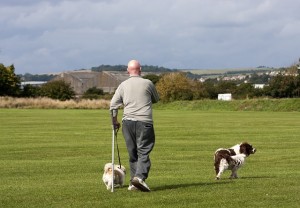Why Do Dogs Lick?
It is important to bear it in mind that your dog doesn’t have the luxury of words like you do to express feelings or emotions. He or she therefore has to resort to doggy means like barking, licking or pica (ingesting inedible objects) in order to get your attention.
The reasons dogs lick are varied but the bottom line is that there is a message being communicated whenever your dog licks you, herself, other people or dogs and objects. It is part of your responsibility to be observant in order to know what is being communicated.
5 Reasons Dogs Lick
Here are few of the general reasons why dogs lick
To Show Affection: Dogs lick to express emotions like love and affection. Just like you, there are times when your dog feels like expressing her adoration and a lick on your face on certain occasions, like when you arrive home, could jolly well be your dog saying “I love you so much” “You mean the world to me” or “Welcome, glad to see you”
To Connect: You may sometimes find your dog giving your visitors or other dogs a lick. They sometimes do this to connect, possibly to pick up a scent from your visitor or to show the other dog that he is welcome.
To Submit: Dogs in a pack lick to show submission to a leader. So on some occasions, your dog licks your hand or feet simply to show submission.
To Clean Up: Your dog may lick her body for the purpose of grooming. However, observe if any part of the body is getting unusual attention. Excessive licking of the anal area may be a sign that he or she needs to use the potty.
For Healing: Your dog may also tend to lick any part of her body that is injured or causing discomfort. The saliva has antibacterial properties and he or she may lick wounds and sores to prevent them from becoming infected. Being watchful will help you notice this early to avoid excessive licking.
What About Compulsive Licking? Normal dog behavior, such as barking and licking, isn’t a problem as long as it doesn’t become compulsive. Compulsive behavior is usually a sign that something is wrong or lacking and can be taken care of through training or by dealing with the root cause.
If the licking happens often or long enough to irritate you or others, then you may need to let your dog know it is not acceptable. However, you need to be discerning to figure out if he or she is just being naughty or is trying to tell you something.
Sometimes, all your dog may be telling you is that the water bowl is empty or that she is bored, anxious afraid or upset about something.










